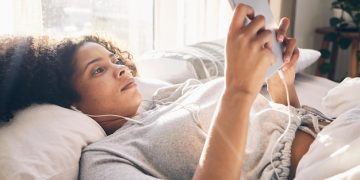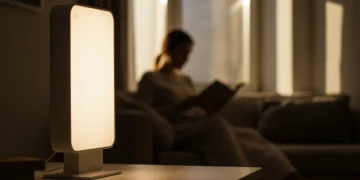Are Blue Light Blocking Glasses Worth It? Sleep Quality Examined
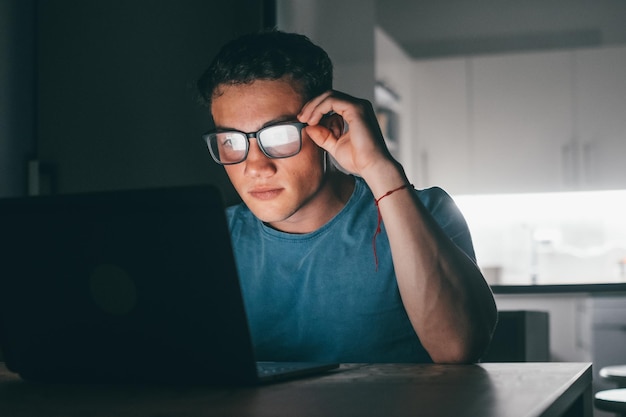
Blue light blocking glasses may offer some benefits in improving sleep quality by filtering out harmful blue light emitted from screens, but their effectiveness can vary depending on individual factors and usage habits.
Are you struggling to get a good night’s sleep in our increasingly digital world? The use of screens has become ubiquitous, and with it, concerns about the impact of blue light on our sleep. Are blue light blocking glasses worth it? Examining the impact on sleep quality is a crucial question for anyone seeking to optimize their sleep and overall well-being.
Understanding Blue Light and its Impact
Blue light is a specific range of the visible light spectrum that is emitted by the sun and digital screens like computers, smartphones, and TVs. While natural blue light from the sun helps regulate our circadian rhythm during the day, excessive exposure to artificial blue light, especially in the evening, can disrupt our sleep patterns. Understanding this impact is key to assessing the value of blue light blocking glasses.
This section will delve into the science behind blue light, exploring how it interacts with our bodies and brains, its effects on sleep quality, and the potential consequences of prolonged exposure. By gaining a comprehensive understanding of blue light, we can better evaluate the effectiveness of blue light blocking glasses.
What is Blue Light?
Blue light is a high-energy, short-wavelength light that is part of the visible light spectrum. It’s naturally present in sunlight, which helps to regulate our sleep-wake cycle, also known as the circadian rhythm. During the day, blue light boosts alertness, mood, and cognitive performance. However, the proliferation of digital devices has significantly increased our exposure to artificial blue light, particularly in the evening.
How Blue Light Affects Sleep
Blue light impacts sleep by suppressing the production of melatonin, a hormone that regulates sleepiness. When blue light hits the photoreceptors in our eyes, it signals the brain to halt melatonin production, making it harder to fall asleep. This interference with the natural sleep cycle can lead to insomnia, reduced sleep quality, and other sleep-related issues. The intensity and duration of blue light exposure play crucial roles in determining its impact on sleep.
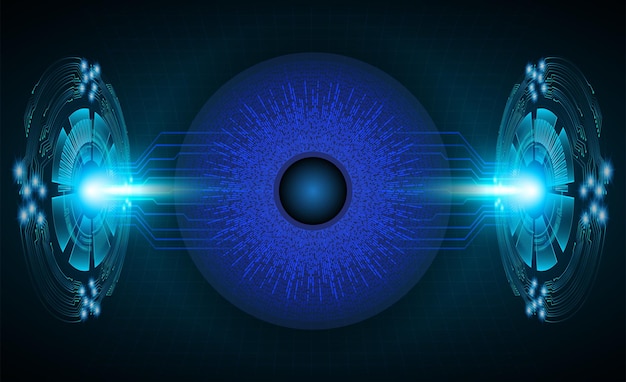
To summarize, blue light, while beneficial during the day, can seriously disrupt sleep patterns when exposure occurs in the evening. Understanding its effects is critical to evaluating measures like blue light blocking glasses, which aim to mitigate these disruptions.
The Science Behind Blue Light Blocking Glasses
Blue light blocking glasses are designed to filter out a portion of the blue light emitted from digital screens. These glasses typically have lenses with a special coating or material that blocks or absorbs blue light, reducing the amount that reaches the eyes. The effectiveness of these glasses depends on the percentage of blue light they block and the specific type of lenses used.
This section examines the science behind how blue light blocking glasses work, the different types of lenses available, and the research on their efficacy in reducing blue light exposure and improving sleep quality. Understanding these facets can help consumers make informed decisions about whether these glasses are worth the investment.
How Blue Light Blocking Glasses Work
Blue light blocking glasses work by using lenses that selectively filter out blue light waves. These lenses are designed with specific coatings or materials that either reflect or absorb blue light, preventing it from reaching the eye. The percentage of blue light blocked can vary depending on the glasses, ranging from 20% to over 90%. Higher percentages typically mean more blue light is filtered out, but it can also affect color perception.
Types of Blue Light Blocking Lenses
There are several types of blue light blocking lenses available, each offering different levels of blue light filtration:
- Clear Lenses: These lenses block a small percentage of blue light (around 20-40%) and are suitable for daytime use to reduce eye strain.
- Yellow or Amber-Tinted Lenses: These lenses block a higher percentage of blue light (50-90%) and are best for evening use to improve sleep.
- Red-Tinted Lenses: These lenses block almost all blue and green light and are designed for use a few hours before bedtime to maximize melatonin production.
In conclusion, the science behind blue light blocking glasses centers on their ability to filter out blue light using specially designed lenses. The effectiveness and suitability of these glasses depend on the type of lenses used and the specific blue light filtering needed for different times of the day.
Do Blue Light Blocking Glasses Improve Sleep Quality?
The primary goal of wearing blue light blocking glasses is to improve sleep quality by reducing the disruptive effects of blue light exposure. While many users report positive effects, such as easier sleep onset and better sleep duration, the scientific evidence is mixed. Studies have shown that the effectiveness of blue light blocking glasses can vary depending on factors like the timing of use, the percentage of blue light blocked, and individual differences.
This section analyzes the scientific evidence on whether blue light blocking glasses improve sleep quality. We will examine the results of clinical trials, meta-analyses, and expert opinions to provide a balanced view of the potential benefits and limitations.
Clinical Trial Results
Numerous clinical trials have investigated the impact of blue light blocking glasses on sleep quality. Some studies have found significant improvements in sleep duration, sleep efficiency, and reduced sleep latency (the time it takes to fall asleep). However, other studies have reported minimal or no significant effects. The conflicting results may be due to differences in study design, lens types, and participant characteristics.
Expert Opinions and Meta-Analyses
Expert opinions on the effectiveness of blue light blocking glasses vary. Some experts support their use, citing evidence of improved sleep outcomes, while others remain skeptical, pointing to limitations in the existing research. Meta-analyses, which combine the results of multiple studies, have provided some support for the use of blue light blocking glasses, particularly for individuals with sleep disturbances.
- The timing of use (wearing them 2-3 hours before bed) is crucial.
- The percentage of blue light blocked by the lenses can impact effectiveness.
- Individual differences in sensitivity to blue light and sleep patterns play a role.
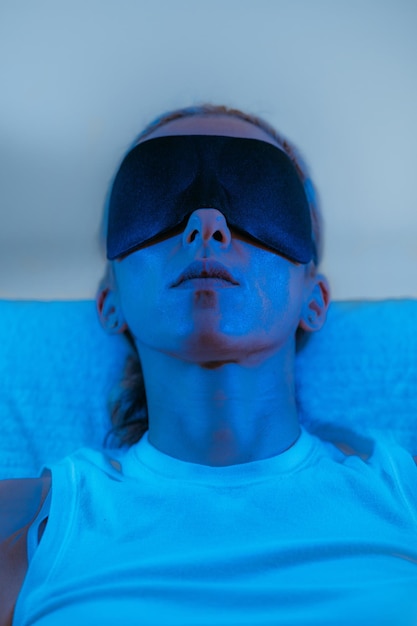
In summary, the scientific evidence on whether blue light blocking glasses improve sleep quality is mixed. While some studies and meta-analyses suggest potential benefits, especially with proper usage, individual experiences can vary. Expert opinions also differ, emphasizing the need for further research to clarify the specific conditions under which these glasses are most effective.
Potential Benefits Beyond Sleep
While the primary focus of blue light blocking glasses is on improving sleep quality, there are other potential benefits that users may experience. These include reduced eye strain, decreased headaches, and improved overall comfort when using digital screens for extended periods. These additional benefits can contribute to enhanced productivity and a more positive experience with digital devices.
This section explores the potential benefits of blue light blocking glasses beyond sleep, including their impact on eye health, comfort, and well-being during screen use. Understanding these benefits can provide a more comprehensive view of the overall value of wearing these glasses.
Reduced Eye Strain
One of the significant benefits of blue light blocking glasses is their ability to reduce eye strain. Prolonged exposure to digital screens can cause symptoms like dry eyes, blurred vision, and eye fatigue. By filtering out blue light, these glasses can help alleviate these symptoms, making it more comfortable to use digital devices for extended periods.
Decreased Headaches
Blue light exposure has been linked to headaches, particularly tension headaches and migraines. Blue light blocking glasses may help decrease the frequency and intensity of headaches by reducing the strain on the eyes and minimizing the triggering effects of blue light.
- Filtering blue light can reduce eye strain.
- Reducing eye strain decreases the likelihood of headaches.
- Improving visual comfort enhances overall well-being.
In conclusion, beyond their primary benefit of improving sleep quality, blue light blocking glasses offer potential advantages such as reduced eye strain and decreased headaches. These additional benefits can enhance the overall experience of using digital devices, contributing to improved comfort and well-being.
Choosing the Right Blue Light Blocking Glasses
Selecting the right pair of blue light blocking glasses is essential to ensure maximum effectiveness and comfort. Factors to consider include the percentage of blue light blocked, lens tint, fit, and style. It’s also important to purchase glasses from reputable brands and consult with an eye care professional to determine the best option for individual needs.
This section provides guidance on choosing the right blue light blocking glasses. We will discuss the key factors to consider, different types of glasses available, and tips for making an informed purchase.
Factors to Consider
When choosing blue light blocking glasses, several factors should be taken into account:
- Percentage of Blue Light Blocked: Determine the appropriate level of blue light filtration based on usage (daytime vs. evening).
- Lens Tint: Consider the tint that suits your needs (clear, yellow, amber, or red).
- Fit and Comfort: Ensure the glasses fit well and are comfortable to wear for extended periods.
Consulting with an Eye Care Professional
Consulting with an eye care professional can provide valuable insights into choosing the right blue light blocking glasses. An eye doctor can assess your specific needs, provide recommendations based on your eye health, and ensure that the glasses meet your individual requirements.
In summary, choosing the right blue light blocking glasses involves careful consideration of factors such as the percentage of blue light blocked, lens tint, fit, and comfort. Consulting with an eye care professional can provide personalized recommendations to ensure the glasses meet your specific needs and preferences.
Potential Downsides and Considerations
While blue light blocking glasses offer potential benefits, there are also potential downsides and considerations to keep in mind. These include altered color perception, the potential for over-reliance on glasses, and the need for further research to fully understand their long-term effects. Being aware of these potential drawbacks can help users make informed decisions about whether these glasses are the right choice for them.
This section discusses the potential downsides and considerations associated with blue light blocking glasses. We will explore the potential negative effects and address common concerns to provide a balanced perspective.
Altered Color Perception
One of the potential downsides of blue light blocking glasses, particularly those with yellow or amber-tinted lenses, is altered color perception. The tint can affect how colors appear, which may be problematic for activities that require accurate color judgment, such as graphic design or certain types of work.
- Choose Clear Lenses: For daytime use, choose clear lenses to minimize color distortion.
- Limit Use: Avoid wearing tinted lenses during activities requiring accurate color perception.
Need for Further Research
While there is growing interest in blue light blocking glasses, more research is needed to fully understand their long-term effects and the specific conditions under which they are most effective. Future studies should focus on larger sample sizes, diverse populations, and standardized methodologies to provide more definitive answers.
| Key Point | Brief Description |
|---|---|
| 😴 Improved Sleep | Blocking blue light before bed can improve sleep quality. |
| 👁️ Reduced Eye Strain | Blue light glasses can help reduce digital eye strain and fatigue. |
| 💡 Usage Timing | Best used a few hours before bed for optimal sleep benefits. |
| 🌈 Color Distortion | Tinted lenses can alter color perception, so be mindful of usage. |
[Título da seção FAQ em en-US]
Frequently Asked Questions
▼
Blue light is a high-energy light emitted by digital screens and the sun. It can suppress melatonin production, disrupting sleep patterns. Reducing exposure, especially before bed, may promote better sleep.
▼
These glasses have lenses that filter out blue light, reducing the amount that reaches your eyes. This can help maintain natural melatonin levels, especially when using screens in the evening.
▼
Some people may experience altered color perception, especially with tinted lenses. It’s essential to choose the right tint and use them appropriately to minimize any potential visual distortions.
▼
Clear lenses are suitable for all-day wear to reduce eye strain. However, tinted lenses should be reserved for evening use as they can affect color perception during daylight hours.
▼
You can purchase them online or from optical stores. Ensure you buy from reputable brands that offer quality lenses and appropriate blue light filtration to guarantee you are getting effective eye protection.
Conclusion
In conclusion, while are blue light blocking glasses worth it? Examining the impact on sleep quality has mixed research to back it up, they can still have a lot of benefits for certain people. By considering the potential downsides, such as altered color perception, and selecting the right type of glasses for your needs, you may achieve better and easier sleep.
